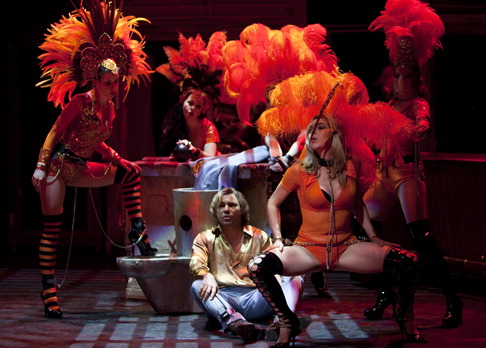08 Feb 2009
The Beggar’s Opera at Covent Garden
Entering the Linbury Studio for this production of The Beggar’s Opera, one might have been forgiven for thinking that one had wandered into the main house by mistake.

Entering the Linbury Studio for this production of The Beggar’s Opera, one might have been forgiven for thinking that one had wandered into the main house by mistake.
A half-drawn stage curtain revealed plush, red velvet upholstery, illuminated by the golden glow of balcony lights, elegant tabs extending into the auditorium space. The designs effectively emphasised the architectural heritage – the current building is the third theatre on this site; the first, the Theatre Royal, having been opened in 1732 by the impresario, John Rich, who also staged the first performance of John Gay’s Beggar’s Opera at his theatre in Lincoln-Inn-Field. However, in the light of this, it was perhaps an unfortunate choice to have actress Sirena Tocco, in the role of the Beggar, dressed as an ROH usher … what does this suggest about ROH wages? Closer inspection of the ‘lavish’ set exposed deliberate signs of structural decay - the ominous cracks and crevices a warning perhaps of the fissures in the ‘concepts’ behind this production.
Despite the visual ingenuity (and indeed, the sets by Kimm Kovac and Andrew Hays vividly and convincingly conjured an appropriately seedy air, as we visited Peachum's off-licence, a lap-dancing club and a jail) what followed on the stage was decidedly less impressive. While musical standards were generally high, the acting skills of these professional opera-singers, dressed as modern-day prostitutes, pimps and villains, left much to be desired. Indeed, at times there was more life in the cardboard ‘audience members’ that gazed, one-dimensionally down from the balconies looming above the stage.
Australian director, Justin Way, directing his first opera in the Linbury Studio Theatre, aimed high but missed his target by miles. If ever the time was ripe for the whole-scale transportation of Gay’s satirical masterpiece from the eighteenth century to the modern age, surely this is it. With the headlines telling lurid tales of alleged bribery in the House of Lords and exposing the self-interested schemes of unscrupulous city bankers, amid the shock of rising unemployment and house repossession rates, this ‘low-life opera’ can still hold up a telling mirror to the greed and corruption endemic in today’s world. Yet this pedestrian production, translated from the taverns and brothels of London past to the sex-shops and red lights of modern-day Soho, lacked punch and grit, missing the obvious opportunities to lampoon and caricature the ‘great and the good’.
Two of the major flaws in this production were inconsistency and incongruity. Gay may have successfully ‘borrowed’ assorted airs and songs from his contemporaries - including Handel and Purcell, only to ridicule them in the process – but this untidy assemblage of sundry ideas lacked coherence. Furthermore, although Britten’s revisions are innovative and interesting, such a complex harmonic and rhythmic treatment of the ‘folksong’ originals did not concur with any of Way’s jumbled ideas, and simply aggravated the muddle.
Similarly, the cast formed a motley crew, a wearying confusion of types and epochs - chavs, skins, Goths, lager louts – among whom the Beggar wandered, aimlessly but apparently angrily, her gestures and movements adding little to an already confused concept.
 Tom Randle as Macheath
Tom Randle as Macheath
The amateurish acting, straight from the village hall, was exacerbated by the fact that there is simply so much dialogue to get through in this ballad opera. Gay wrote his piece for actors who could sing; this production gave us singers who can’t act. Unconvincing soap-opera stereotypes, the cast adopted ‘Mockney’ accents, an uncomfortable idiom for the antiquated diction, which was delivered woodenly and unconvincingly. They seemed distracted by their pseudo-erotic costumes, the female chorus writhing embarrassingly in their peep-show booths, and were left drifting in the absence of meaningful choreography, or even basic stagecraft. When they weren’t wanted on stage, they climbed into the faux dress-circle and passively observed the events. Most frustratingly, moments of superb music-making were sadly destroyed by the jarring return to lengthy passages of confusing spoken text.
At least one could close one’s eyes and listen to some glorious singing. Tom Randle, as Macheath, presented a perfect ‘lovable rake’, his warm, smooth tenor bringing out the lyric simplicity of Gay’s airs, though his acting was little better than the rest of the leaden cast. The Peachums were a convincingly criminal clan: in particular, Leah-Marian Jones relished Polly Peachum’s uninhibited strutting, and made an engaging foil to Sarah Fox’s Lucy Lockit – although both conveyed a vocal tenderness and sweetness that belied their dramatic stridency. The laughs were supplied by the ‘old guard’ - Susan Bickley (Mrs Peachum), Jeremy White (Mr Peachum) and Donald Maxwell (Lockit). And, despite a pre-performance announcement that she was suffering from a severe sore throat, mezzo-soprano Frances McCafferty was a superbly grotesque Diana Trapes.
 A scene from The Beggar's Opera
A scene from The Beggar's Opera
But, the trouble was, quite simply, that it was all far too middle-class and ‘nice’.
Scottish-born Christian Curnyn, standing in for the late Richard Hickcox and making his ROH debut, led the musicians of the City of London Sinfonia in courageous style, striving in vain to inject some energy into this flagging show. His vigorous gestures, fully visible to the audience via the oddly-positioned stage screens, did draw some excellent ensemble playing from the twelve-piece chamber orchestra; and the challenging obliggato solos were delivered with confidence and élan.
The final verdict? More pantomime than parody, more Gilbert and Sullivan than Brecht … and more boredom than bite.
Claire Seymour